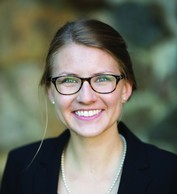STILLPOINT Archive: last updated 11/11/2015
Winning essay
“On the Reality of Hope”
Recently I found hope for Gordon College in a letter written in December of 1958 by Flannery O’Connor. O’ Connor writes: “All human nature vigorously resists grace because grace changes us and the change is painful”; and so this year our community has felt the pain of changing grace, of becoming more like Christ.
From the perspective of a student trying her best to understand conflict and incite compromise, after two semesters full of letters, tweets, and overheard conversations, dialogue seems to be backlogged (or not, no one can even really agree on that). From any perspective—faculty to alumni to student—and no matter where you place the blame or responsibility, Gordon has undeniably felt strife this past year. The tension is at times tangible, and progress often seems unattainable. Just the suggestion of hope is frustrating—it feels bankrupt and shallow. Yet hope is the most important reality to be uncovered in this tumultuous time.
In his famed poem “Four Quartets,” in the passage for which this publication is named, T. S. Eliot writes: “At the still point of the turning world[;] Neither flesh nor fleshless; Neither from nor towards; at the still point, there the dance is.” At this still point, “where past and future are gathered,” is “the inner freedom from practical desire, the release from action and suffering . . . yet surrounded by a grace of sense.”
Christ is the still point of our turning world that Eliot elucidates so gracefully. And so, Gordon as a community, and we as members of this community, must call back to Him and remember our hope. As the world turns and leaves us shaken and confused, as the presence of the past smashes into the reality of the future, Christ remains stable—the release from constant action and suffering, the grace of sense that surrounds us. As we find that Christian community often leads to disagreements and frustrations, we must not forget as we wrestle towards peace and truth that we can only find solid footing in Christ. Institutional growing pains are acts of grace in the life of our college; they are compelling us to a better sense of Truth and of each other.
Often, during growing pains like these, I forget that Scripture has come before me. In 2 Corinthians, Paul commends the church to “not lose heart, though outwardly we are wasting away, yet inwardly we are being renewed day by day” because “the one who raised the Lord Jesus from the dead will also raise us.” The Gospel, the hope of resurrection and completion through Jesus, renews us from the inside out, although at times it looks like we are wasting away and renewal does not feel like what we would expect it to. The greatest act of grace was an act of suffering, Jesus’s death on the cross. Victory over the grave could only come after his entrance into the grave.
In Romans, Paul writes, “suffering produces perseverance; perseverance, character; and character, hope.” I have always struggled to comprehend the transformation of suffering to hope. But, with the help of Flannery O’Connor, T. S. Eliot, and Gordon College, I have begun to realize that hope really “does not put us to shame, because God’s love has been poured out into our hearts through the Holy Spirit.” Through His Spirit, through the very legitimate appearances of suffering and turmoil, we can find hope in a Lord who suffered to bring us painful, changing grace. To merely be critical or apathetic is lazy; to uncover hope is difficultly faithful.
This year has been a trying one, but I know that the reality of hope courses beneath the suffering. Suffering is a reality of the Christian life, but it is not the final reality. When we let suffering negate this final reality—the reality of hope—we insult the cross. We must dwell in our suffering with grace, not simply negate it for a shallow ‘hope’ but embrace it for the deep difficult reality of a hope that it is founded in the crucifixion. We must stop resisting grace because it is painful. Through tension there is unity and through argument there is compromise. At Christ, our still point, there the dance is.
_____________
Hannah Wardell is a political science major from Colorado Springs. This year she is a Gordon Presidential Fellow in the College’s Office of Marketing and Strategic Communications.
[email protected]
Honorable Mention | excerpt from “It Tastes Good”
I was nine or ten and approached the Table like I always did. . . . Watching Dad, Mom, Abby and Hilary receive the bread and wine shaped my understanding of the sacrament. It wasn’t anything spectacular, it’s just what we and all Christians did. (It wasn’t until arriving at Gordon that I realized this notion wasn’t true—you can imagine the shock). And so when it was our turn to go up, I got in line behind my parents and shuffled to the priest in front of the altar. I cupped my hands just like Dad, right over left, and extended them in front of me. “This is the body of Christ, the bread of Heaven. Keep you in everlasting life.”
Read the full essay at www.gordon.edu/jafessay
__________________
Sam Sherratt majored in biology and minored in chemistry. He now is senior research scientist at Elucida Research LLC in Beverly, MA, where he works on projects in the pharmaceutical industry.
Our brains often sort our experiences into pre-established patterns even when we lack evidence those experiences are consistent with those patterns, or when the patterns are themselves logically unsound. . . . So we see meaning in horoscopes even though we know there’s no scientific basis for their accuracy. We see religious figures in pieces of toast. And we stereotype people, cultures, and situations, constantly and unconsciously and near ubiquitously. Our brains are extremely efficient machines. Racism, sexism, classism, et cetera—all these systems which distort our perception of the world—are very often not decisions we make; they’re products of the way all our brains process information. That is what science tells us about appearance and reality that I could not have philosophized or poeticized my way to.
Read the full essay at www.gordon.edu/jafessay
_____________________
Christy Urbano is an English major and gender studies minor from Coatesville, Pennsylvania. She plans to pursue a graduate degree in library and information sciences.


